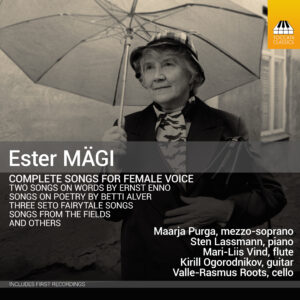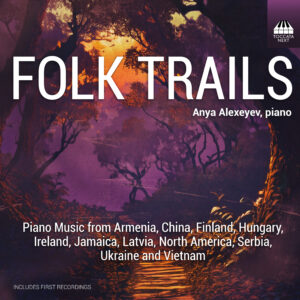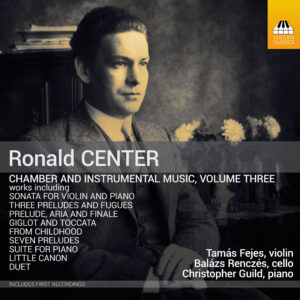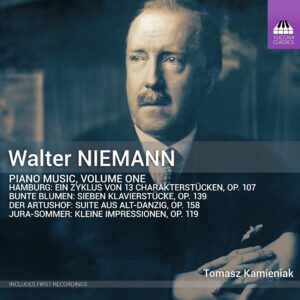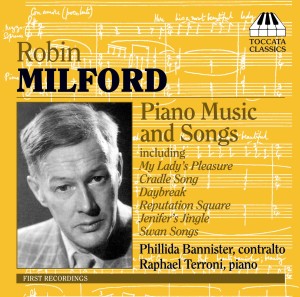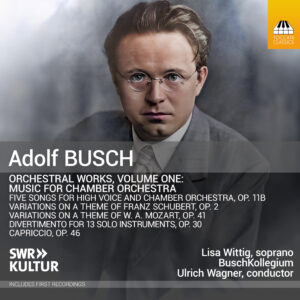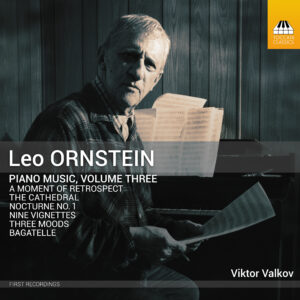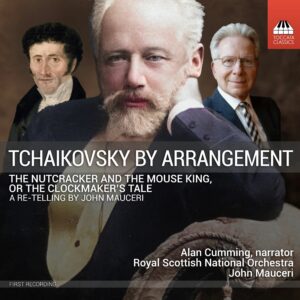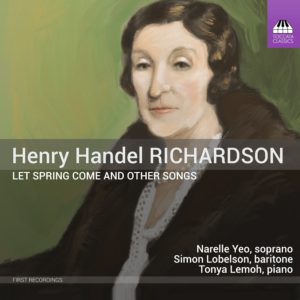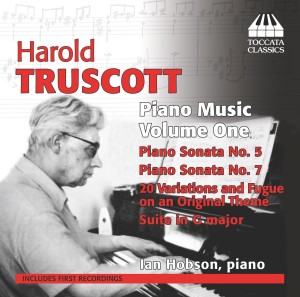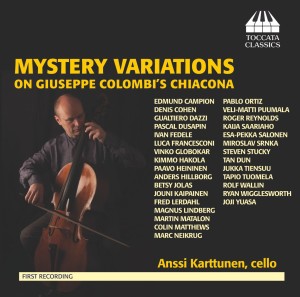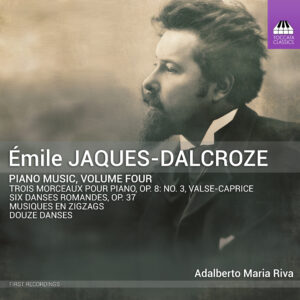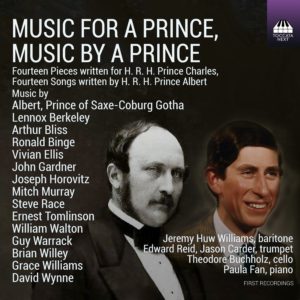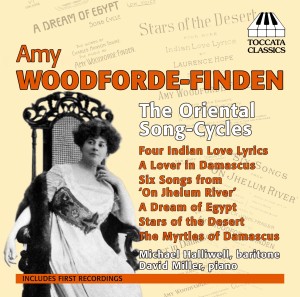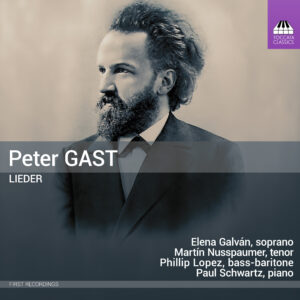Search Results for "The Black Alley Newty Ping" – Page 6
Showing results for black alley net ping
Ester Mägi: Complete Songs for Female Voice
For the latter part of her long life, Ester Mägi (1922–2021) was known as ‘the First Lady of Estonian music’, her modest, charming disposition endearing her to all who met her. But her music reveals the true strength of her personality, and this first complete recording of her songs for female voice – over half a century of compositional activity – covers a striking emotional range, from the ambivalent feelings of falling in love to dramatic ritual invocations of startling force and power. Many of the earlier songs are openly romantic, but Mägi soon began to tap into the hypnotic energy of Estonian runic folksong, with its echoes of village life and its incantations intended to placate a hostile environment.
Maarja Purga, mezzo-soprano
Valle-Rasmus Roots, cello
Mari-Liis Vind, flute
Kirill Ogorodnikov, guitar
Sten Lassmann, piano
Folk Trails
Folk-music has been a resource for classical composers since the beginning of the western tradition. The violin has its own folk heritage, of course, but since you can’t lug a piano from village to village, composers for that instrument have had to dig into their own musical roots to generate a folk-based keyboard repertoire, usually with refreshing results. This recital takes the listener on a journey that spans three continents, east to west, marrying the resources of the modern concert grand with the immediacy of the folk originals.
Anya Alexeyev, piano, primo
Leslie De’Ath, secondo
Ronald Center: Instrumental and Chamber Music, Volume Three
Ronald Center (1913–73) is sometimes described as ‘the Scottish Bartók’, and his music does indeed capture some of the wild energy of the Scottish landscape in a style of Bartókian asperity. It also shows affinities with the music of Busoni, Debussy, Prokofiev, Shostakovich and Vaughan Williams, absorbed into an individual style that is audibly Scots. Center was essentially a miniaturist, his meticulous craftsmanship allowing him to encompass a range of emotions – heart-felt sorrow, grim humour, relaxed lyricism, dark despair – in a crisp and succinct manner, animated by sharp wit and irony. Many of the works recorded here also show off his skill as a contrapuntist and one, surprisingly, is a rumba.
Tamás Fejes, violin
Balázs Renczés, cello
Christopher Guild, piano
Walter Niemann: Piano Music, Volume One
The largest part of the output of the Hamburg-born composer and writer Walter Niemann (1876–1973), a student of both Humperdinck and Reinecke, is piano music: an astonishing 1,000 or so pieces, divided into 189 opus numbers. Most of them are lyrical miniatures in a warm and approachable late-Romantic style, some evoking the music of the past. Occasionally, though, as in Hamburg, a recollection of scenes from his childhood, a degree of mild dissonance indicates his desire to stay true to his memories of growing up in a port city.
Tomasz Kamieniak, piano
Robin Milford: Piano Music and Songs
The music of Robin Milford (1903-59) taps into that distinctly English vein of pastoral melancholy. Lying on a continuum between the work of his friends Gerald Finzi and Ralph Vaughan Williams, Milford’s voice is nonetheless unique: lyrical, gentle, unemphatic – quietly individual. The dark lyricism of the songs on this CD, reflecting the composer’s troubled life, offers a striking contrast with the buoyant, folksong-inspired dances for solo piano – Milford at his happiest.
Phillida Bannister, contralto
Raphael Terroni, piano
Adolf Busch: Orchestral Works, Volume One
Long celebrated as one of the finest violinists in history and the leader of an exemplary string quartet, Adolf Busch (1891–1952) is slowly being discovered also as a major composer, with a style close to that of his good friend Max Reger. As with Reger, Busch combines effortless counterpoint, warm harmonies, a strong sense of orchestral colour and an ear for a good tune – as witness the five works to be heard here, four of them in their first recordings and the other in its first modern recording.
Lisa Wittig, soprano
BuschKollegium
Ulrich Wagner, conductor
Leo Ornstein: Piano Music, Volume Three
Leo Ornstein is as well known for his extraordinary longevity as for his music: he was born in Ukraine in 1893 and died in Wisconsin in 2002, aged at least 108. His generous output of music, much of it for the piano, his own instrument, remains poorly known, although it can stand shoulder to shoulder with that of many better-known names. Some of the pieces here – which cover a span of over 60 years – have their roots in Debussy, Skryabin and Szymanowski, but Ornstein welds those influences into an edgy, energetic language very much his own. The Three Moods of c. 1914 are anger, grief and joy, but there is strength of feeling in all the music to be heard here. Indeed, the Nine Vignettes bear a misleading title: they are substantial and powerful virtuoso essays which can flare up into moments of startling power and violence; hitherto unknown, they constitute a major contribution to the piano literature.
Viktor Valkov, piano
Tchaikovsky by Arrangement: The Nutcracker and the Mouse King or The Clockmaker’s Tale: A Re-telling by John Mauceri
Tchaikovsky’s ballet The Nutcracker, which has its origins in a novella by E. T. A. Hoffmann, contains some of the best-loved music ever written. But its composer wasn’t very happy with it, perhaps because the plot he was given to work with allowed him to present only a series of dances, losing the moral basis of Hoffman’s surprisingly modern tale, with its messages of inclusivity and what is now called ‘women’s agency’ – here it is the little girl who saves the prince. Hoffmann’s aspirational story continues well after the ballet ends, with the little girl, now grown up, marrying the prince, who is now king. John Mauceri has brought the ballet back to its inspiration, calling on music from elsewhere in Tchaikovsky’s orchestral output to fashion this ‘re-telling’, marrying Hoffmann’s text and Tchaikovsky’s music for the first time.
This is very much a Scottish product, by the way, even leaving aside Toccata’s Scottish origins: the orchestra is the Royal Scottish National Orchestra, John Mauceri spent seven years as music director of Scottish Opera in Glasgow, and the narrator is Alan Cumming, now a NY-based gay icon but born in Aberfeldy and brought up in Carnoustie.
Alan Cumming, narrator
Royal Scottish National Orchestra
John Mauceri, conductor
Henry Handel Richardson: Let Spring Come and other Songs
The Australian writer Henry Handel Richardson (1870–1946) was christened Ethel Florence Lindesay Richardson: she adopted a male nom de plume in anticipation of professional prejudice. Although she made an international reputation as a novelist, she first trained as a pianist, and she wrote songs all her life – but they remained unpublished, so that her output as a composer has been completely overlooked. Her songs are straightforward and melodious, drawing their inspiration from Romantic German Lieder and Edwardian drawing-room ballads, lullabies and parlour songs in the manner of Bridge, Ireland, Quilter and other such composers.
Narelle Yeo, soprano (Tracks 1 –10, 14–18, 24–32)
Simon Lobelson, baritone (Tracks 11 – 13, 19 – 23)
Tonya Lemoh, piano
Harold Truscott: Piano Music, Volume One
Harold Truscott (1914-92) enjoyed a reputation as one of Britain's most perceptive writers on music, a doughty champion of many neglected composers who have now become familiar figures. But Truscott himself was a composer of some stature, writing in an individual style that is rooted in Beethoven and Schubert but also absorbs the influences of Nielsen, Medtner and Hindemith. This is the first CD in a series which will present his substantial corpus of piano music.
Ian Hobson, piano
Mystery Variations on Giuseppe Colombi’s Chiacona
To celebrate the 50th birthday of the Finnish cellist Anssi Karttunen in 2010 his wife, Muriel von Braun, and colleague and countrywoman Kaija Saariaho wrote to a number of composers with whose music Karttunen had been working, asking each to write a variation on the Chiacona per basso solo by the Italian composer Giuseppe Colombi (1635-94) — perhaps the earliest work in the history of the cello. The composers were not told who else was involved in the project, and Karttunen agreed to perform the music before he had seen it — hence the title, Mystery Variations. These 31 variations thus link the very beginning of the cello repertoire with music by some of the most distinguished composers of the present day and, with their distant echo of Beethoven's 32 'Diabelli' Variations, provide a showcase for the extraordinary resourcefulness of contemporary cello technique.
Anssi Karttunen, cello
Émile Jaques-Dalcroze: Piano Music, Volume Four
The Swiss composer Émile Jaques-Dalcroze (1865–1950) is best remembered for his development of Eurhythmics, which teaches the appreciation of music through movement. The buoyant miniatures recorded on this fourth album of his piano music document his fascination with dance, but nonetheless display a degree of variety: some are winsome and charming, others vigorous and folk-like, and occasionally they suggest echoes of some of his French contemporaries, not least Chabrier, Debussy, Fauré and Ravel.
Adalberto Maria Riva, piano
Music for a Prince, Music by a Prince: Fourteen Pieces written for H. R. H. Prince Charles, Fourteen Songs written by H. R. H. Prince Albert
This unusual recording brings princely offerings of two different kinds. In 1970 Prince Charles – who had studied cello and trumpet – was presented with a leather-bound volume containing pieces written for his entertainment by the composers on the council of the Performing Right Society. These fourteen bonnes bouches are complemented by fourteen German Lieder written by Prince Charles’ great-great-great-grandfather, Prince Albert, the Prince Consort, whose style owed something to that of his good friend, Felix Mendelssohn.
Jeremy Huw Williams, baritone (Tracks 15, 18–31)
Theodore Buchholz, cello (Tracks 1, 2, 4, 6-9, 11-14, 17)
Edward Reid, trumpet (Tracks 3, 4, 5, 8, 10, 11, 14)
Jason Carder, trumpet (Track 16)
Paula Fan, piano (Tracks 1-7, 10, 12, 14-31)
Amy Woodforde-Finden: The Oriental Song-Cycles
Amy Woodforde-Finden (1860-1919) wrote a number of 'oriental' song-cycles, one of which, the Four Indian Love Lyrics of 1902, contained the 'Kashmiri Song' — beginning 'Pale hands I loved beside the Shalimar' — that became a runaway success in its own day. These ballads have long since fallen from favour, but they contain plenty of honest sentiment, good tunes and splashes of local colour — and their hints of inter-racial love and lesbian romance must have given a real frisson to their contemporary audiences.
Michael Halliwell, baritone
David Miller, piano
Dvořák: ‘Songs My Great-Grandfather Taught Me’
Antonín Dvořák has long been known as one of music's supreme melodists, but his songs have not made quite the headway of his best-known works. Now 30 of them are given a new lease of life in transcriptions for violin and viola and piano by his great-grandson, Josef Suk — the viola pieces performed here on Dvořák's own instrument, restored especially for this recording. With Josef Suk joined here by Vladimir Ashkenazy, this disc offers two of the world's greatest musicians playing — together for the first time — some of its most beautiful music, in versions never heard before.
Josef Suk, violin, viola
Vladimir Ashkenazy, piano
Peter Gast: Lieder
The composer Peter Gast (1854–1918) – real name Heinrich Köselitz – is best remembered as a friend and posthumous editor of Friedrich Nietzsche rather than for his own music, which was kept under lock and key in communist East Germany for half a century; only recently has it begun to be performed and recorded. ‘Il faut méditerraniser la musique’, Nietzsche argued, and Gast’s Lieder, in a reaction against Wagnerian gloom, do just that, singing of love, life, springtime, drinking and youthful ardour; even the more wistful songs have a spring in their step.
Elena Galván, soprano
Martín Nusspaumer, tenor
Phillip Lopez, bass-baritone
Paul Schwartz, piano
Stay In the Know
JOIN THE TOCCATA NEWSLETTER
"*" indicates required fields
By visiting our site, you agree to our privacy policy regarding cookies, tracking statistics, etc.
